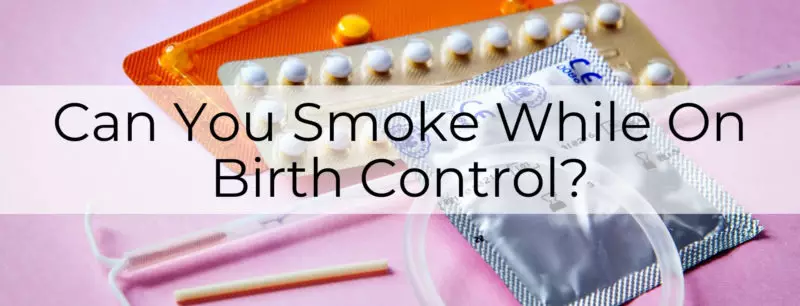
According to the CDC, about 65% of American women aged 19-50 use contraception, and 12.6% of these women take an oral contraceptive pill. [1]
Another interesting statistic is that 13.5% of American women smoke actively. [2]
You may have heard that women who take hormonal contraceptives should stop smoking as smoking increases the risk of blood clot formation and intensifies the adverse effects of birth control. But is this true?
In this article, we look into the types of birth control, the link between smoking and the use of hormonal contraceptives and what risks you bear if you are an active smoker and take birth control pills.
Let’s dive in.
Types of birth control
The different types of birth control are divided into 2 main categories: barrier and chemical contraception. [3]
Common barrier birth control [4]
- Condoms: 79-85% effective
- Diaphragm: 88% effective
- Cervical cap: 71-86% effective
- Contraceptive sponge: 76-88% effective
Common chemical birth control [4]
- Spermicide gel: 72-86% effective
- IUD: 99% effective
- Birth control implant: 99% effective
- Birth control shot: 94% effective
- Birth control vaginal ring: 91% effective
- Birth control patch: 91% effective
- Birth control pill: 91% effective

That being said, hormonal birth control is associated with more adverse effects and health risks compared to other types of contraception.
Hormonal birth control risks
Using hormonal birth control may lead to high levels of estrogen and/or progestin in the body.
COCs could be also associated with slightly increased risk of blood clot formation (thrombosis) in an artery or vein (venous thromboembolism: VTE). In severe rare cases, if left untreated, the blood clot may break off (especially if the blood pressure is high) and cause pulmonary embolism, heart attack, or stroke. [4]
Since the rate of VTE in young women is low, the absolute risk of VTE in COC users is approximately 0.06 per 100 pill-years. This risk is greatest in the first few months of use and is considerably lower than that seen in pregnancy and the early postpartum period (0.2 per 100 years).
The absolute risk is higher among women with associated conditions such as thrombophilia. Other contributors are those predisposing to thromboembolism including smoking, obesity, polycystic ovary syndrome, older age, and immobilization.
Birth control with lower-dose formulations of estrogen (like the pill) has a lower risk of blood clots. With that in mind, women using birth control patch are at higher risk of blood clots than women on the pill. [5] This is because more estrogen is absorbed transdermally. Up to 60% more.
Besides, the formulation of progestin in combined birth control pills could also play a role in blood clot formation. Desogestrel and drospirenone are associated with a higher risk of thrombosis compared to other types of progestins. [5]

Your healthcare provider can evaluate your personal risk factors for thrombosis, and advise you whether hormonal birth control is suitable for you. They can also prescribe contraception with a suitable dose of hormones that fit your health condition and lifestyle.
Smoking on birth control
Both hormonal birth control and smoking may pose potential health risks of cardiovascular disease, stroke, and thrombosis.
Doctors often advise their patients not to smoke if they use hormonal contraception like the pill, patch, implant, ring, shot, or hormonal IUD. This is because smoking may further increase the risk of blood clot formation and heart disease.
How dangerous is smoking and using birth control pills?
According to Jefferson Health, a combination of hormonal birth control and smoking can have deadly outcomes. [6]
The source notes that the blood vessels of long-term smokers are likely harder and more restricted. This way smokers bear a higher risk of plaque buildup and even atherosclerosis, stroke, and heart attack.
Jefferson Health also notes that women who take birth control pills, smoke, and are over 35 years of age, have metabolic syndrome, or chronic inflammation in the body are at the highest risk. Combination of smoking and taking high-dose birth control pills (50mcg estradiol) is also considered a very high-risk factor. [7]
A 1999 paper even suggested that oral contraceptives should be denied to women over 35 years of age who smoke cigarettes heavily (more than 15 cigarettes a day). That being said, taking low-dose contraceptive pills (20 mcg estradiol) could be safe for non-smokers over 35. [8]
*Smoking in this section refers to smoking cigarettes, tobacco, other substances containing nicotine, or vaping (containing liquid nicotine).

How to stop smoking?
Planned Parenthood gives 9 recommendations that can help you stop smoking [9] :
- Try saving the money you would have spent on cigarettes to buy something special
- Exercise to distract yourself from cigarette cravings
- Socialize with non-smokers
- Snack on low-calorie vegetables to keep your hands and mouth active
- Keep a list of reasons you want to quit and look at it every day
- Ask your family and friends to help you
- Practice deep breathing and relaxation
- Chew sugarless gum
- Drink cold water
Birth control safe for smokers
If you can’t quit smoking, consider changing the contraception you use: from hormonal to non-hormonal. Birth control methods safe for smokers are:
-
All physical contraception (condoms, diaphragm, etc.)
-
Spermicide gel
-
Non-hormonal IUD








